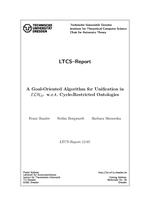LATPub716: Unterschied zwischen den Versionen
Aus International Center for Computational Logic
Marcel Lippmann (Diskussion | Beiträge) KKeine Bearbeitungszusammenfassung |
Marcel Lippmann (Diskussion | Beiträge) KKeine Bearbeitungszusammenfassung |
||
| (2 dazwischenliegende Versionen desselben Benutzers werden nicht angezeigt) | |||
| Zeile 5: | Zeile 5: | ||
}} | }} | ||
{{Techreport | {{Techreport | ||
|Title=A Goal-Oriented Algorithm for Unification in | |Title=A Goal-Oriented Algorithm for Unification in ELH_R^+ w.r.t. Cycle-Restricted Ontologies | ||
|Year=2012 | |Year=2012 | ||
|Month= | |Month= | ||
| Zeile 15: | Zeile 15: | ||
}} | }} | ||
{{Publikation Details | {{Publikation Details | ||
|Abstract=Unification in Description Logics (DLs) has been proposed as an inference | |Abstract=Unification in Description Logics (DLs) has been proposed as an inference service that can, for example, be used to detect redundancies in ontologies. For the DL EL, which is used to define several large biomedical ontologies, unification is NP-complete. A goal-oriented NP unification algorithm for EL that uses nondeterministic rules to transform a given unification problem into solved form has recently been presented. In this report, we extend this goal-oriented algorithm in two directions: on the one hand, we add general concept inclusion axioms (GCIs), and on the other hand, we add role hierarchies (H) and transitive roles (R+). For the algorithm to be complete, however, the ontology consisting of the GCIs and role axioms needs to satisfy a certain cycle restriction. | ||
service that can, for example, be used to detect redundancies in ontologies. | |||
For the DL EL, which is used to define several large | |||
biomedical ontologies, unification is NP-complete. A goal-oriented NP unification | |||
algorithm for EL that uses nondeterministic rules to transform a given unification | |||
problem into solved form has recently been presented. In this report, we extend this goal-oriented | |||
algorithm in two directions: on the one hand, we add general concept inclusion axioms (GCIs), | |||
and on the other hand, we add role hierarchies (H) and transitive roles (R+). For | |||
the algorithm to be complete, however, the ontology consisting of the GCIs and role axioms | |||
needs to satisfy a certain cycle restriction. | |||
|ISBN= | |ISBN= | ||
|ISSN= | |ISSN= | ||
| Zeile 44: | Zeile 34: | ||
year = {2012}, | year = {2012}, | ||
} | } | ||
}} | }} | ||
Aktuelle Version vom 25. März 2015, 16:34 Uhr
A Goal-Oriented Algorithm for Unification in ELH_R^+ w.r.t. Cycle-Restricted Ontologies
Franz BaaderFranz Baader, Stefan BorgwardtStefan Borgwardt, Barbara MorawskaBarbara Morawska
Franz Baader, Stefan Borgwardt, Barbara Morawska
A Goal-Oriented Algorithm for Unification in ELH_R^+ w.r.t. Cycle-Restricted Ontologies
Technical Report, Chair for Automata Theory, Institute for Theoretical Computer Science, Technische Universität Dresden, volume 12-05, 2012. LTCS-Report
A Goal-Oriented Algorithm for Unification in ELH_R^+ w.r.t. Cycle-Restricted Ontologies
Technical Report, Chair for Automata Theory, Institute for Theoretical Computer Science, Technische Universität Dresden, volume 12-05, 2012. LTCS-Report
- KurzfassungAbstract
Unification in Description Logics (DLs) has been proposed as an inference service that can, for example, be used to detect redundancies in ontologies. For the DL EL, which is used to define several large biomedical ontologies, unification is NP-complete. A goal-oriented NP unification algorithm for EL that uses nondeterministic rules to transform a given unification problem into solved form has recently been presented. In this report, we extend this goal-oriented algorithm in two directions: on the one hand, we add general concept inclusion axioms (GCIs), and on the other hand, we add role hierarchies (H) and transitive roles (R+). For the algorithm to be complete, however, the ontology consisting of the GCIs and role axioms needs to satisfy a certain cycle restriction. - Bemerkung: Note: See http://lat.inf.tu-dresden.de/research/reports.html.
- Forschungsgruppe:Research Group: AutomatentheorieAutomata Theory
@techreport{ BaBM-LTCS-12-05,
address = {Dresden, Germany},
author = {Franz {Baader} and Stefan {Borgwardt} and Barbara {Morawska}},
institution = {Chair for Automata Theory, Institute for Theoretical Computer Science, Technische Universit{\"a}t Dresden},
note = {See http://lat.inf.tu-dresden.de/research/reports.html.},
number = {12-05},
title = {A Goal-Oriented Algorithm for Unification in {$\mathcal{ELH}_{R^+}$} w.r.t. Cycle-Restricted Ontologies},
type = {LTCS-Report},
year = {2012},
}
